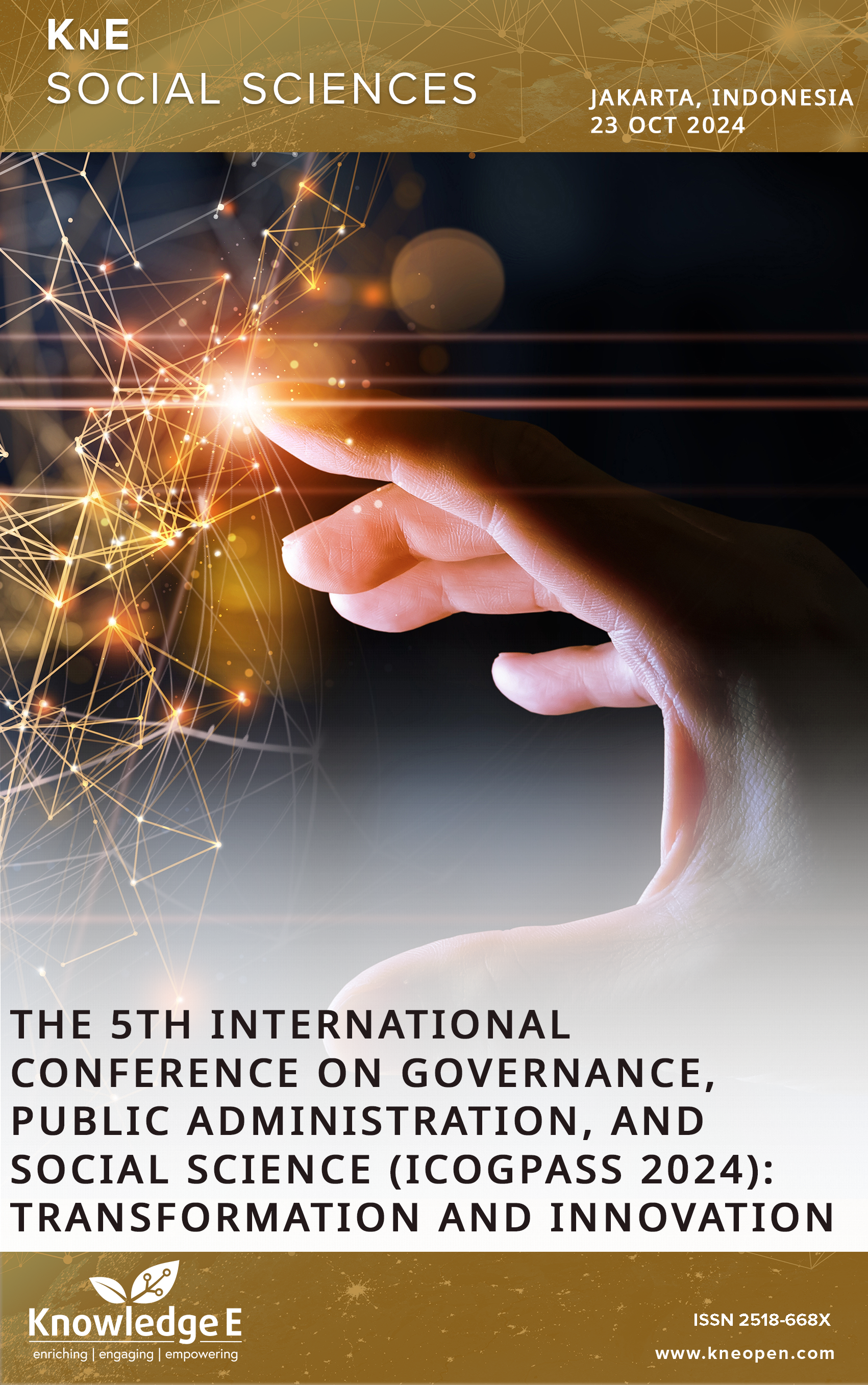Towards Smart Cities Implementing Collaborative Governance Models for Urban Sanitation Improvement
DOI:
https://doi.org/10.18502/kss.v10i16.19166Keywords:
smart city, urban sanitation, collaborative governance, SLR, bibliometric analysisAbstract
This study examines the application of collaborative governance models to improve urban sanitation in the context of smart cities, especially in areas with rapid urbanization. Using a Systematic Literature Review (SLR) and bibliometric analysis, the study maps trends and opportunities for collaboration between various parties, including the government, private sector, communities, and academia. The findings reveal that collaborative approaches have proven effective in improving sanitation management capacity through technological integration and active participation of various stakeholders, although they still face challenges such as complex coordination and financial sustainability. By referring to the theoretical framework of collaborative governance and the concept of smart cities, this study provides a practical guide for policymakers to maximize collaboration in urban sanitation, strengthen the role of digital technologies, and accelerate the transition to cleaner, healthier, and more sustainable cities.
References
[1] Syaodih E. The Challenges of Urban Management in Indonesia. 2019;307(SoRes 2018):485–8. https://doi.org/10.2991/sores-18.2019.111.
[2] Szpilko D, de la Torre Gallegos A, Jimenez Naharro F, Rzepka A, Remiszewska A. Waste Management in the Smart City: Current Practices and Future Directions. Resources (Basel). 2023;12(10):1–25.
[3] Chumo I, Mberu B, Wainaina C, Murigi W, Sumba L, Kabaria C. Sanitation services for the urban poor: A social capital approach to sanitation challenges in informal settlements [Internet]. PLOS Water. 2023;2(12):e0000086.
[4] Davis A, Javernick-Will A, Cook SM. The use of qualitative comparative analysis to identify pathways to successful and failed sanitation systems [Internet]. Sci Total Environ. 2019 May;663:507–17. Available from: https://www.sciencedirect.com/science/article/pii/S0048969719303341
[5] Ben Yahia N, Eljaoued W, Bellamine Ben Saoud N, Colomo-Palacios R. Towards sustainable collaborative networks for smart cities cogovernance [Internet]. Int J Inf Manage. 2021;56:102037. Available from: https://www.sciencedirect.com/science/article/pii/S0268401219302452
[6] Mora L, Deakin M, Reid A. Strategic principles for smart city development: A multiple case study analysis of European best practices [Internet]. Technol Forecast Soc Change. 2019;142:70–97. Available from: https://www.sciencedirect.com/science/article/pii/S0040162517318590
[7] Mills DE, Izadgoshasb I, Pudney SG. Smart city collaboration: A review and an agenda for establishing sustainable collaboration. Sustainability (Basel). 2021;13(16):9189.
[8] Wirtz BW, Müller WM. An Integrative Collaborative Ecosystem for Smart Cities — A Framework for Organizational Governance [Internet]. Int J Public Adm. 2023 May;46(7):499–518.
[9] Broccardo L, Culasso F, Mauro SG. Smart city governance: exploring the institutional work of multiple actors towards collaboration. Int J Public Sector Management. 2019 Jan;32(4):367–87.
[10] Mishra S, Jena L, Tripathy HK, Gaber T. Prioritized and predictive intelligence of things enabled waste management model in smart and sustainable environment. PLoS One [Internet]. 2022;17(8 August):1–22. Available from: https://doi.org/10.1371/journal.pone.0272383.
[11] Watabe S, Lohman HA, Li Y, Morgan VL, Rowles LS, Stephen T, et al. Advancing the Economic and Environmental Sustainability of the NEWgenerator Nonsewered Sanitation System. ACS Environ Au. 2023 May;3(4):209–22.
[12] Usamah, Nur Fadillah, Khairin Nisa; Muhamad Falak Cahyadi; Muh. Yusril Ilyas. Muh. Yusril Ilyas, Usamah, Nur Fadillah, Khairin Nisa. Community Empowerment Through The Gade Clean and Gold Program at Garbage Banks in Manggala District, Makassar City. Formosa J Appl Sci. 2023;2(5):663–72.
[13] Naumov V, Radchenko E, Sedikh V, Vdovina A. Public-private partnership in the field of waste management, not related to municipal solid waste. IOP Conf Ser Earth Environ Sci. 2022;981(4):042078.
[14] Schroeder S, Fernandez T, Stöffler S. Contextualised guidelines and indicators for smart and sustainable urban project definition at local level in developing countries. Rozw Reg i Polityka Reg. 2022;15(60 Specjalny):55–69. https://doi.org/10.14746/rrpr.2022.60s.06.
[15] Baldi G, Megaro A, Carrubbo L. Small-Town Citizens’ Technology Acceptance of Smart and Sustainable City Development. Sustain. 2023;15(1).
[16] Bergan P, Mölders AM, Rehring K, Ahlemann F, Decker S, Reining S. Towards designing effective governance regimes for smart city initiatives: The case of the city of Duisburg. Proc Annu Hawaii Int Conf Syst Sci. 2020;2020-January:2323–32.
[17] Denker A. Protection of privacy and personal data in the big data environment of smart cities. Int Arch Photogramm Remote Sens Spat Inf Sci - ISPRS Arch. 2021;46(4/W5-2021):181–6. https://doi.org/10.5194/isprs-archives-XLVI-4-W5- 2021-181-2021.
[18] Lee J, Babcock J, Pham TS, Bui TH, Kang M. Smart city as a social transition towards inclusive development through technology: a tale of four smart cities [Internet]. Int J Urban Sci. 2023;27(sup1 S1):75–100.
[19] Zhao F, Fashola OI, Olarewaju TI, Onwumere I. Smart city research: A holistic and state-of-the-art literature review [Internet]. Cities. 2021;119:103406. Available from: https://www.sciencedirect.com/science/article/pii/S026427512100305X
Published
How to Cite
Issue
Section
License
Copyright (c) 2025 Erfina, Sundari, Andi Nilwana, Yayuk Astuti, Sandi Lubis

This work is licensed under a Creative Commons Attribution 4.0 International License.

